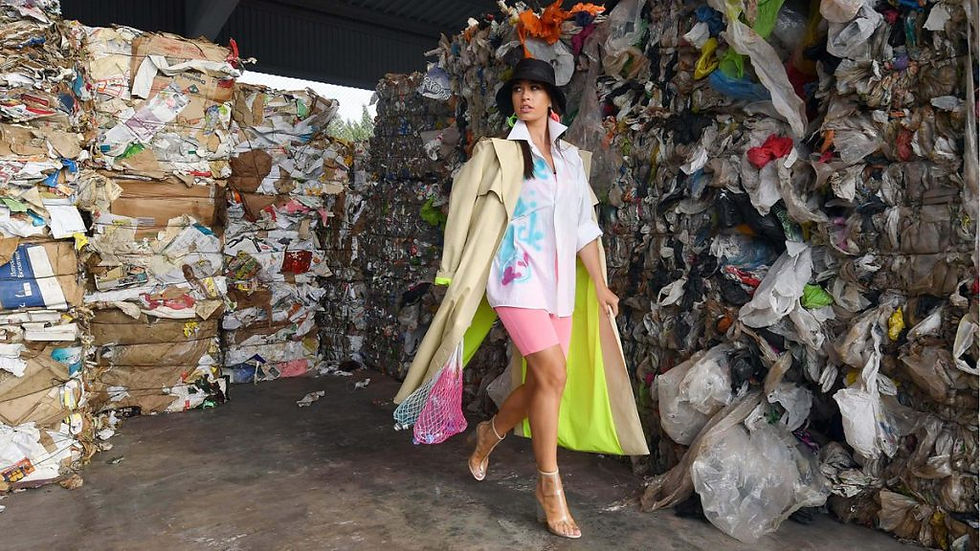What is Fast Fashion, and what makes it so harmful?
- Amaya H
- Nov 2, 2022
- 3 min read
With the rise of mega-brands like SHEIN, currently valued at $100 billion, the topic of “fast fashion” has become a hot one in the world of fashion and sustainability. But what necessarily equates to fast fashion, and why are people so against it?

According to The Good Trade, Fast fashion is “a design, manufacturing, and marketing method focused on rapidly producing high volumes of clothing. Fast fashion garment production leverages trend replication and low-quality materials (like synthetic fabrics) in order to bring inexpensive styles to the end consumer.”
In other words, brands like SHEIN produce ‘trendy’ clothing items in humongous quantities at an unreasonably fast turnaround through unethical and unsustainable practices to maximize the amount of money their brand can acquire. The quick turnaround time between a trend being seen on a catwalk or in some form of social media to the time it’s produced and sold by these brands is previously unheard of. This lightning-fast access to hot flash clothing trends is what’s made these clothing brands so popular, especially to those often unable to afford expensive fashion brands. Fast fashion brands often utilize unethical labor, often through workers overseas, who are paid obscenely low wages while working in terrible environments. Their use of cheap labor and low-quality materials like polyester characterizes their ability to have such low prices compared to other companies. As seen by SHEIN’S success, these low prices keep consumers coming.

Fast-fashion brands rely on the unattainable speed of trends coming and going to consistently fuel product consumption from their customers. These brands produce about 52 “micro seasons,” or in other words, one collection a week. This outrageous rate of item production cultivates a culture of constantly feeling behind in adopting trends and creates a constant need to purchase new clothes to keep up. This has led to an industry-wide adoption of overconsumption, contributing to harmful impacts on our environment, garment workers, animals, and consumers.
“Fast fashion isn’t free. Someone, somewhere is paying.”
All the characterizing factors of fast fashion, inexpensive pricing, quick production, trend replication, cheap labor, and materials, provide a massive harmful impact on the planet and its workers. As mentioned previously, fast fashion runs on quick production at high rates. This leads to an insanely high amount of material consumption, simply unsustainable to the environment. Consumers who purchase from fast-fashion brands can constantly buy large amounts of products at cheap prices. This leads to an insane amount of waste in clothing, as these items are often thrown away within 2-3 years and purchased at a much higher quantity and rate than from higher-end fashion brands. Fast fashion brands like Boohoo, SHEIN, or Fashion Nova utilize harmful, cheap materials like synthetic dyes, toxic chemicals, and cheap fabrics that pollute the water. The fashion industry is one of the largest polluters of clean water globally, in line with agriculture. In addition, these garments made from terrible material are unable to break down. As so many of these items are thrown away in such close proximity to their use, millions of tons of clothing items pile up in landfills, unable to break down and releasing toxic chemicals in the air. The labor itself is also toxic. Most of these fast fashion laborers have no employee rights and obscenely low wages, and they also tend to work in unsafe environments. Chemicals utilized in these items are found to be extremely harmful, such as Benzothiazole, which has been linked to several types of respiratory illnesses and cancers. A study in Environmental Health Journal found that conventional textile dying releases “heavy metals and other toxicants that can adversely impact the health of animals in addition to nearby residents.” One thing’s for sure, whether one is producing or consuming these products, the materials utilized are unsafe for all.
What can you do?
As the serious harms of fast fashion have come to light, an emphasis on mindful, quality and sustainably-based clothing purchasing has arisen. To combat the detrimental effects these brands are supplying to our environment and our world, Golden Girl encourages you to do serious research on the clothing brands you purchase from and do your best to boycott brands that utilize fast fashion and exploit its benefits.
Don't forget to subscribe to Golden Girl and share this post!



Comments